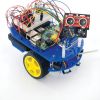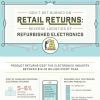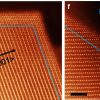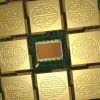-
 +16 +3
+16 +3Six Clicks: Insanely great Raspberry Pi devices you can build yourself
The question isn't: "What can you do with a Raspberry Pi?" The question is: "What can't you do with a Raspberry Pi?"
-
 +31 +4
+31 +4Graphene: The material that will change the world (Video)
An introduction to the wonderful world of Graphene.
-
 +17 +5
+17 +5Highly hackable, open source laptop smashes crowdfunding goal | ZDNet
The Novena open source computer is expected to start shipping in November after raising just over $700,000, more than double its crowd funding target.
-
 +13 +4
+13 +4Don’t Get Burned On Retail Returns Reverse Logistics Of Refurbished Electronics
a look at the world of reverse logistics
-
 +23 +5
+23 +5The Harper government to allow passengers to use portable electronic devices during all phases of flight - Canada News Centre
The Honourable Lisa Raitt, Minister of Transport, today announced an important change that will benefit travellers flying with Canadian air operators, as well as the aviation industry. Passengers will soon be able to use portable electronic devices such as cameras, electronic games, tablets and computers during all phases of flight.
-
 +23 +6
+23 +6Scientists discover the reason that batteries lose capacity over time: Nanocrystals!
In the struggle to develop better batteries, it’s the overall capacity that tends to get most of the attention — we marvel when a new smartphone crams in a few more milliamp-hours. Capacity is nothing without the longevity to survive a large number of repeated charging cycles, though. Even the most advanced lithium-ion batteries still lose capacity as they age, and there’s no way to prevent that until we know the cause, which we might thanks to two new studies from the US Department of Energy.
-
 +12 +4
+12 +48 Creative Ways to Destroy Your Laptop -
There are so many ways to destroy your laptop. If electronic evolution was based on survival of the fittest, the laptop would be extinct.
-
 +18 +3
+18 +3The Promise of a Ten Minute Charge, Without Tesla's Patents
Battery charge-time is more than a matter of convenience. In the case of electric cars, it could be the difference between full-on adoption and affluent novelty, or the difference between a clean(er) transportation future or one that clings to portable combustion machines until the bitter end, because who can even wait for things nowadays. Indeed, an issue now is how long electric cars take to charge: doing it at home, which is the ideal case, can take many hours—overnight—while doing it at...
-
 +26 +7
+26 +7How Sony's Betamax lost to JVC's VHS Cassette Recorder
In 1976 Sony introduced the Betamax video cassette recorder. It catalyzed the "on demand" of today by allowing users to record television shows, and the machine ignited the first "new media" intellectual property battles. In only a decade this revolutionary machine disappeared, beaten by JVS's version of the cassette recorder. This video tells the story of why Betamax failed.
-
 +1 +1
+1 +1Cable TV boxes become 2nd biggest energy users in many homes
In the middle of the night, when most Americans are sound asleep, their lights and appliances off, a power hog is wide awake and running at nearly full throttle: the boxes that operate their cable or satellite television service.
-
 +18 +4
+18 +4The First Microchip Went Up for Auction and No One Bought It
In 1958, Texas Instruments engineer Jack Kilby created the first integrated circuit, an invention that would go on to define modern technology. It became the ancestor of today's microchips, which power almost all modern electronic devices. Kilby won the Nobel Prize in Physics for this microchip in 2000.
-
 +19 +4
+19 +4Scientists create new battery that's cheap, clean, rechargeable... and organic
Scientists at USC have developed a water-based organic battery that is long lasting, built from cheap, eco-friendly components.
-
 +17 +3
+17 +3ReWalk bionic suit can now be sold in the US
The motorized exoskeleton that Claire Lomas wore during her historic marathon walk may soon be available for purchase in the United States. As of yesterday, the US Food and Drug Administration...
-
 +12 +3
+12 +3Morphable machines: Shape-shifting robots possible with new phase-changing material
Scientists have developed a material that can switch between hard and soft states, which they say could enable the creation of low-cost, morphing robots. Developed as part of a research project with Boston Dynamics, the Google-owned robotics company, the material was built with wax and foam by researchers from MIT, Max Planck Institute for Dynamics and Self-Organization and Stony Brook University.
-
 +26 +7
+26 +7Carbon nanotube chips could bring us pocket-sized super computers
A new theoretical carbon nanotube-based chip stack could eventually deliver the same raw power as the IBM Watson, only in pocket-sized form.
-
 +21 +7
+21 +7Researchers achieve 'holy grail' of battery design: A stable lithium anode
Engineers across the globe have been racing to design smaller, cheaper and more efficient rechargeable batteries to meet the power storage needs of everything from handheld gadgets to electric cars.
-
 +28 +5
+28 +5WTF Just Happened: My New HDTV Makes Movies Look Unnaturally Smooth
You just bought a brand-new TV, but instead of being blown away by the picture you’re starting to think it actually makes everything look worse. Well, maybe worse is the wrong word. Unnaturally smooth is more like it. Movies don’t look like movies; they look like they were shot on a camcorder. Why is your TV fixing what ain’t broke?
-
 +25 +6
+25 +6IBM Unveils a ‘Brain-Like’ Chip With 4,000 Processor Cores
The human brain is the world’s most sophisticated computer, capable of learning new things on the fly, using very little data. It can recognize objects, understand speech, respond to change. Since the early days of digital technology, scientists have worked to build computers that were more like the three-pound organ inside your head.
-
 +25 +4
+25 +4Artificial retina: Physicists develop an interface to the optical nerve
Physicists at Technische Universitat Munchen (TUM) are using the special properties of graphene to produce key elements of an artificial retina. With their research program the researchers were admitted to the heavily funded 'Graphene' Flagship Program of the European Union.
-
 +18 +5
+18 +5Appraisal: Toshiba 2008 LCD Flatscreen TV
Gizmodo Editor in Chief Brian Barrett visited the ANTIQUES ROADSHOW set in Birmingham, AL, with his old Toshiba flatscreen TV in tow. Our expert Gary Piattoni assessed his item and reminds us all that age and value have no correlation. Watch to find out how much it's worth
Submit a link
Start a discussion




















